|
Tag: investments
-

Stop Sitting on Blocks: Participate in the AEW 2023 African Farmout Forum
-
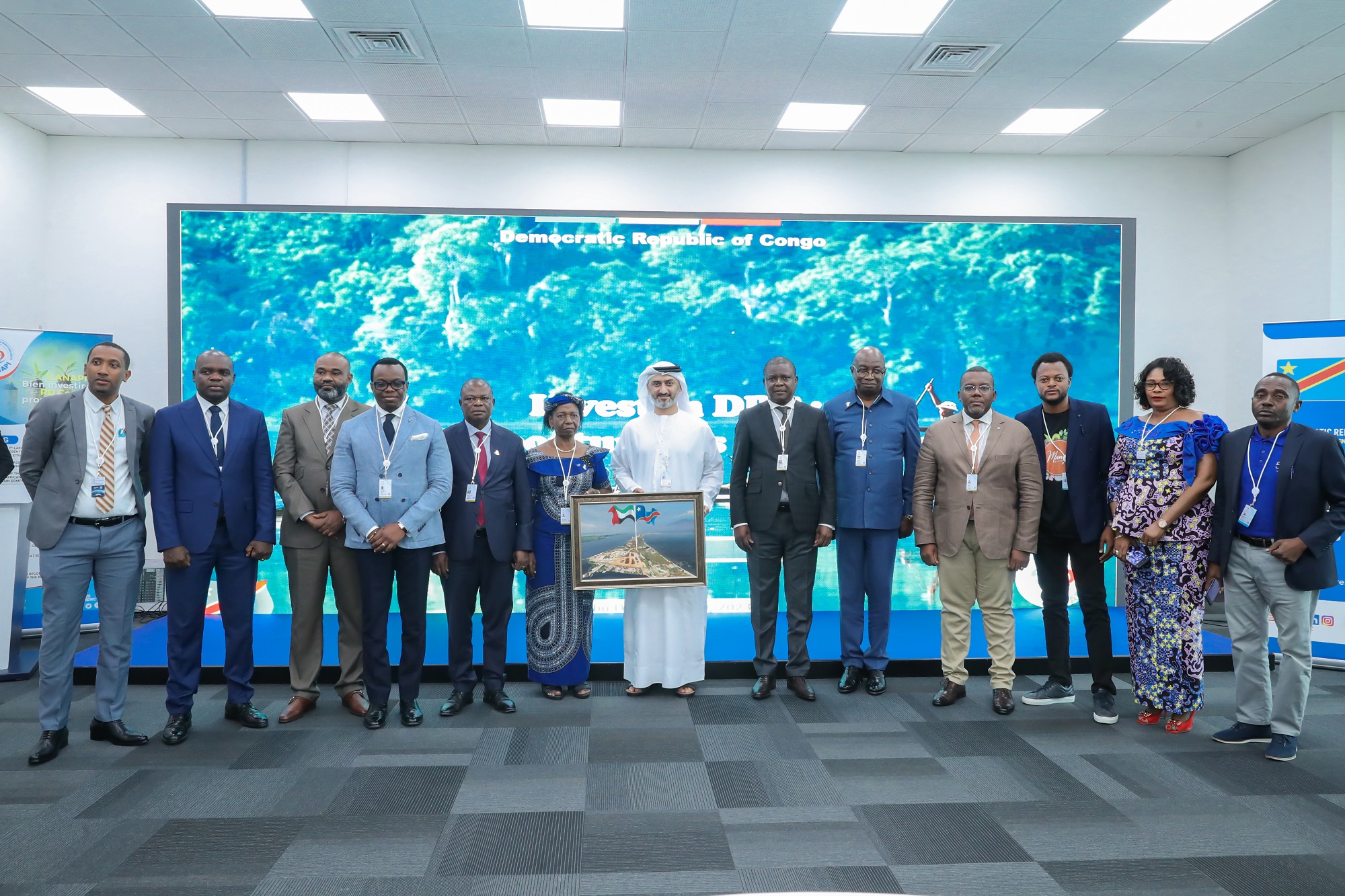
Humanity International Investments: DRC and UAE to Collaborate on Economic Cooperation, Investment, and Infrastructure as discussed at Annual Investment Meeting
Abu Dhabi, United Arab Emirates, May 10, 2023: The 12th edition of the Annual Investment Meeting (AIM) announced today that the Democratic Republic of the Congo (DRC) and the United Arab Emirates will collaborate on various projects focused on economic cooperation, investment, and infrastructure in addition to promoting humanitarian assistance efforts.
This forum was led by Aly Ramji, the General Partner at Humanity International Investments, and included several high-profile speakers as H.E. Mrs. Marie Ndjeka Opombo, the Ambassador of the Democratic Republic of the Congo to the United Arab Emirates, Rashid Al Taneji, Director of Trade, Marcel Kanda, Chief of Staff of the Planning Ministry of Congo, John Kabeya Shikayi, Governor of Central Kasai, Malo Mobutu, Governor of North Ubangi, Governor Jean Claude Mabenze of South Ubangi, Dr. Guy BANDU Governor of Central Congo and Governor Jean Robert Nzanza Bombiti of Bas Uele province .
This session highlighted various reconstruction projects and collaborations with stakeholders as well as focused on a partnership between Congo and the UAE that is aimed at investing in gold. The session highlighted the formation of a joint venture with the Minister of Finance and Treasury with 55% for the UAE and 45% for Congo, which would focus on gold.
The session also discussed the significant 45% bilateral growth rate in trade between the UAE and the DRC. The UAE is seeking potential partners to invest in the DRC and has signed agreements with India, Israel, Turkey, and Indonesia, and is now looking forward to enhancing relations with African countries as well, including the DRC.
Marcel Kanda, Chief of Staff of the Planning Ministry of Congo, expressed his ambition for agricultural transformation in the country by developing a value chain in agriculture by 2040, aiming to position Congo as an emerging country. The government of Congo is committed to implementing structural reforms that focus on improving infrastructure and creating a conducive business environment to attract investors.
In addition, the forum also highlighted the agricultural and mining potential of the Central Kasai province, citing that the region has 8,000 acres of fertile land and favorable natural conditions that allow for the possibility of producing crops up to three times a year. It also emphasized the agricultural and mining potential of the North Ubangi province and highlighted the natural resources of gold and diamonds in the region, as well as its involvement in various projects related to agriculture and infrastructure.
Lastly, the session also provided the importance of developing the agriculture in Bas Uele for its vast forests and favourable climate conditions, which can support the cultivation of various crops. The governor’s vision is to make the DRC one of the greatest countries in terms of agriculture and attract expertise and business investment in the sector.
In conclusion, this partnership will open doors to investment and trade opportunities that will benefit both countries while promoting stability and development in the region.
-
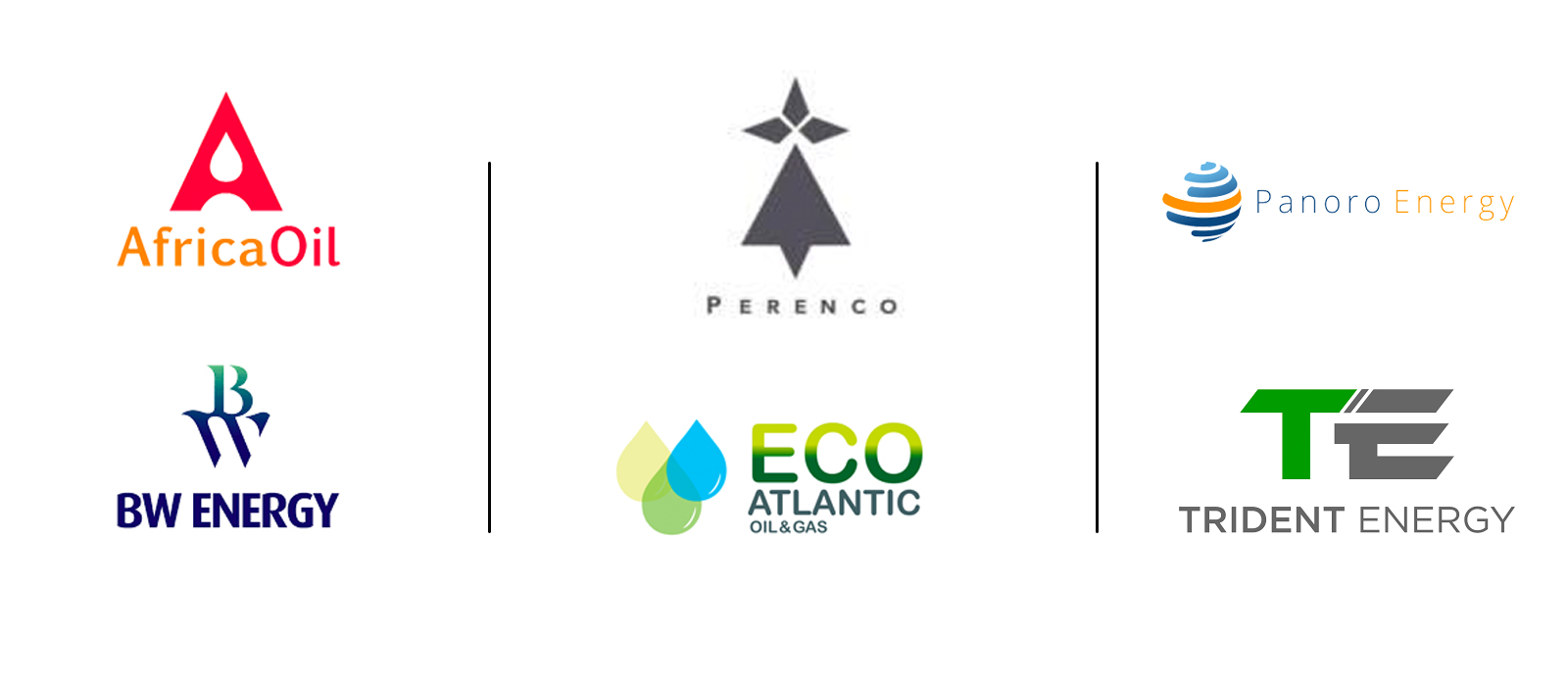
Independents Energy Companies are Raring to Go in Africa in 2023 with Sustainable Energy Development (By NJ Ayuk)
OPINION PIECE
They’re bringing private capital, experience, and know-how to the continent JOHANNESBURG, South Africa, December 26, 2022/ — By NJ Ayuk, Executive Chairman, African Energy Chamber In late 2019, Africa Oil Corp. President and CEO Keith Hill told Petroleum Economist that, given Africa’s unproven oil and gas basins, the continent was probably “the greatest frontier,” with outstanding opportunities for exploration, production, and development companies, including independents.
Three years later, Hill remains bullish about Africa, and Canada-headquartered Africa Oil Corp. is driving oil and gas exploration here. The company is part of a growing trend we’re seeing: independent oil and gas companies that recognize the tremendous promise of our underexplored continent and are finding ways to thrive here — and make a positive impact.
I’m extremely optimistic about independents like Africa Oil Corp and BW Energy, which are building on their successful track records in exploration and production, and Perenco, which is building Africa’s natural gas industry. I’m encouraged by the efforts of Trident Energy, which is finding ways to bolster production in mature fields, and by Eco Atlantic, which has been convincing investors not to turn their backs on our continent. Companies like these are exactly what Africa needs. They’re bringing private capital, experience, and know-how to the continent. They are accelerating resource monetization and maximization for the good of Africa. And, honestly, I can’t wait to see what they do in 2023.
Putting Natural Gas to Work for Africa
As David Christianson so eloquently put it in a recent blog for Trade Law Centre (tralac), a South Africa-based think tank, “Africa’s gas future is floating offshore.” Floating liquified natural gas (FLNG) units are an ideal way to capitalize on Africa’s abundant natural gas resources. They can be deployed rapidly and more affordably than onshore LNG trains, creating a practical pathway to gas monetization. London-headquartered independent, Perenco, which has operated in Cameroon for nearly 30 years, is capitalizing on these opportunities.
Not only did Perenco establish an FLNG plant in Cameroon, it made history there. The Hilli Episeyo FLNG, which began commercial operations in March 2018, is the world’s second-ever FLNG plant to enter operation and the first in the world to operate from a converted LNG tanker. The plant, moored off the coast of Kribi, is the property of Norwegian Golar. Not only does the project have global significance, but it also involves local entities. Perenco partnered with Cameroon’s Société Nationale des Hydrocarbures (National Hydrocarbons Company) to launch the project. The Hilli Episeyo is designed to produce 2.4 million metric tonnes per annum (MMTPA) of LNG and has 125,000 cubic meters of storage capacity. Natural gas for the plant is sourced from Perenco’s Sanaga and Ebome gas fields.
What’s more, Perenco is growing its upstream activity in the continent. Earlier this year, it signed a deal with oil and gas company New Age Ltd. to buy its stake and take over the operatorship of the Etinde gas field, which is in shallow water in the Rio del Rey Basin offshore Cameroon. In July, Perenco acquired Anglo-Swiss multinational Glencore’s entities in North Africa, The acquisition includes PetroChad Mangara, which operates the Mangara, Badila, and Krim oilfields in Chad’s Doba Basin. And in November, the company announced it had discovered oil in the Tchibeli North East pre-salt Vandji exploration prospect offshore Congo, describing it as a potential “play opener.”
Each of these activities and successes represents potential for greater energy security, economic growth, and based on Perenco’s track record, more good jobs for Africans.
Perenco is a strong example of an independent that has successfully developed strategies for Africa’s unique challenges, needs, and opportunities. And, it’s not alone.
Breathing New Life Into Maturing Fields
Look at British independent Trident Energy, which is introducing a new era of operational efficiency and production improvements in Equatorial Guinea.
Trident’s business strategy calls for acquiring mid-life producing assets around the globe, particularly oil and gas fields lacking attention and investment, re-developing them, increasing production, and unlocking reserves. In Africa, where we’re seeing production declines occur in legacy assets throughout the continent, this approach is tremendously valuable.
In Equatorial Guinea, Trident is the operator of Block G, which includes the producing Ceiba and Okume Complex fields — made up of six oil fields in the Gulf of Guinea, in shallow and deep water in the Rio Muni basin – with a 40.375% working interest. The company also holds a 40% stake in Block S, W & EG-21.
In May of this year, the Ministry of Mines and Hydrocarbons of Equatorial Guinea and Trident’s joint venture partners for Block G, Kosmos Energy, Panoro Energy, and GEPetrol, agreed to extend the Production Sharing Contract (PSC) for the block through 2040, giving Trident more time to unlock the block’s full potential.
Trident has earned the respect of both the government and the companies it works with. Trident credits those strong working relationships with the company’s commitment to be an active, visible member of the communities where it operates.
Foreign project leaders and their families relocate in-country, as the company fulfils its role as a major contributor to the local economy and community. Most importantly building local capacity and improving local content has been a key strategy for the company’s leadership.
Trident also is known for offering local residents high-quality jobs and respectful treatment; for creating empowering skill development, healthcare, and education programs in host communities; and for implementing best practices to protect the environment.
Trident Energy’s upgrades at Okume Field, which have been underway this year, call for converting 15 gas lift wells to electrical submersible pumps (ESPs), which are more affordable to operate and maintain.
To prepare for the conversion, the company has been working on a $57 million upgrade at Okume’s central processing facilities. Trident Energy’s team in Equatorial Guinea has managed every aspect of the project including supply chain, logistics, and coordination. Approximately 55% of the services (in-value) were provided by local contractors; 32% of services were provided by regional contractors; and only 13% were provided by international contractors.
Projects that boost production in declining assets, like the Okume upgrades, are extremely important for both Equatorial Guinea and the continent at large. We hope more companies follow Trident’s lead.
Setting the Stage for Success
The African Energy Chamber also has been impressed with Norwegian independent BW Energy, which has been very strategic in its approach to gas exploration and production in Namibia.
BW, which also has a strong presence in Gabon, targets proven offshore oil and gas reservoirs and minimizes risk with phased developments. By operating in sites with existing production facilities, the company reduces time to first oil and keeps cash flow in check, the company website explains.
In 2017, the company acquired a 56% stake in the Kudu gas field in the northern Orange sub-basin, approximately 130 kilometers off the southwest coast of Namibia. Several years later, BW increased its interest in the gas project to 95%.
The Kudu field is believed to hold at least 1.3 trillion cubic feet (tcf) of gas, but the site has remained undeveloped since ChevronTexaco first discovered gas there in 1974. The field has had a long string of operators, but as Pan-African research agency Hawilti put it, factors ranging from the inability to agree on a gas price to delays in getting governmental support projects have kept the project in limbo. The site’s isolated location, and lack of infrastructure to transport gas, have not helped matters.
But, with BW in the driver’s seat, I believe that chapter is now closed. As announced during African Energy Week in Cape Town, BW is pursuing a revised development plan for Kudu that includes using a repurposed semisubmersible drilling rig as a floating production unit (FPU), which will allow it to move gas onshore for domestic energy generation. BW purchased the rig it needs for this effort earlier this year.
BW’s efforts could have far-reaching effects on day-to-day life in Namibia. Currently, the country relies on electricity imports to meet its domestic needs. BW’s work at Kudu will help provide the gas Namibia means to reliably deliver electricity to its people, drive industrial growth, create jobs, and position Namibia as a regional energy hub.
Overcoming Hurdles, Modeling Determination
Another independent modeling what can be achieved in Africa is Toronto-headquartered Eco Atlantic. It has been overcoming the challenges of raising capital in an era when companies are being pressured not to begin new oil and gas projects on our continent.In April, Eco Atlantic raised approximately $25.5 million to cover drilling expenses on the Gazania-1 well, on Block 2B offshore South Africa, although the company announced that its evaluation well did not show evidence of commercial hydrocarbons. That’s not stopping the company from moving forward in Africa. Along with its partners, Africa Energy Corp, Panoro 2B Limited (a subsidiary of Panoro Energy ASA), and Crown Energy AB, Eco Atlantic is planning additional exploration drilling, including a two-well campaign on Block 3B/4B offshore South Africa, set to begin in 2023, and at least one well on the Orinduik Block offshore Guyana.
“While it is naturally disappointing not having made a commercial discovery, the Gazania-1 well was only the first of four wells we have planned for the next 18-24 months across our wider portfolio,” Eco Atlantic co-founder and CEO Gil Holzman said.
Tenacity is a required trait for all companies in this industry. Eco Atlantic’s ongoing commitment to exploring South Africa’s offshore basins is commendable.
As recently as Dec. 19, the company announced its subsidiary, Azinam Limited, had acquired another 6.25% participating interest in Block 3B/4B offshore South Africa. Eco Atlantic also received regulatory approval for the acquisition. Now Eco Atlantic will hold an increased participating interest of 26.25% in Block 3B/4B, with Africa Oil Corp., the block’s operator, and Cape Town-based upstream company, Ricocure.
Big Finds, Big Ambitions
As for Africa Oil Corp., one of its strengths is the respect it has earned in the sector and among government leaders. The company has been involved in such major finds as the 2022 Venus light oil discovery made with Total Energies offshore Namibia (through subsidiary Impact Oil & Gas Limited).Since then, the company has kept its focus on continued exploration operations. It has producing and development assets in deep-water offshore Nigeria, development assets in Kenya, and a portfolio of exploration assets in Guyana, Kenya, Namibia, Nigeria, South Africa, and the Senegal Guinea Bissau Joint Development Zone (AGC).
The companies’ successes in East Africa are particularly exciting. Exploration in Kenya within the last decade has opened two new basins that extend into southern Somalia. Keith recently told Energy, Oil & Gas magazine that the basins cover an area the size of the North Sea.
And in Puntland, the company is confident that it found an oilfield through drilling on the Shabeel well.
Hill said he remembers when most companies believed opportunities in East Africa were limited.
“At most oil and gas conferences today the universal opinion is that East Africa now represents one of the hottest oil and gas exploration areas anywhere in the world,” he said. “Africa Oil Corp’s forward thinking approach meant that it was able to get in and secure all the acreage it wanted before this region really took off. What that means is that today you are looking at an organization that boasts the best onshore acreage position of any company now present in East Africa.”
Well done.
Earlier this year, I said Africa will not achieve the energy future it wants, including making energy poverty history, without the presence of independents. Today, that truth is clearer than ever. Yes, majors and national oil companies still have an important part to play in Africa’s energy industry, but the independent companies at work here are giving us every reason to be optimistic about Africa’s future.
Distributed by APO Group on behalf of African Energy Week (AEW).SOURCE
African Energy Week (AEW) -
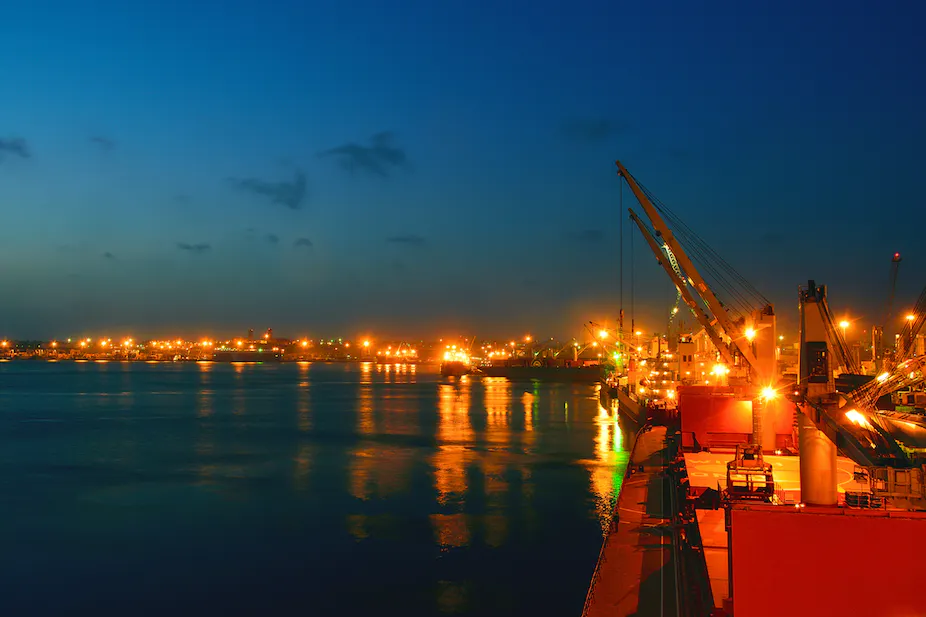
Africa’s free trade area offers promise for cities – but only if there’s investment
Published: July 25, 2022 3.57pm SAST
The African Continental Free Trade Area came into operation on 1 January 2021. This is a considerable achievement. The free trade area is now the world’s single largest market for goods and services, when measured by number of countries, after the World Trade Organisation. It is also the largest in terms of geographic area and population size.
If implemented as foreseen by the agreement, the free trade area will unlock significant growth for the African continent. The World Bank has estimated that by 2035, trade between African countries could expand by 81%, boosting output by US$450 billion, raising wages by 10%, particularly benefiting women, and lifting 30 million people out of extreme poverty.
These expectations, based on research into the links between trade and economic growth, have generated excitement and political impetus around getting the free trade area working.
Less well understood, however, is the fact that for the agreement to fulfil its promises, the continent’s cities are key. They are hubs for production and consumption, and will become significantly more so. But their current set-up, lacking the necessary infrastructure and services, means most of Africa’s cities are not yet ready to benefit from and support the free trade area. This will require substantially greater investments in the continent’s cities.
This link between urbanisation and trade is analysed in the United Nations Economic Commission for Africa’s recently launched publication, Cities: Gateways for Africa‘s Regional Economic Integration.
What cities bring to the party
The importance of cities in unlocking the benefits of the free trade area is premised on three well established advantages of the economic density that cities can provide.
Firstly, firms, which are the primary vehicles for producing goods for export, prefer to be in cities. There, they are closer to a larger pool of labour and to each other. This proximity enables them to specialise but still have access to inputs for their production processes from other firms. They can also learn from each other, which spurs innovation.
Secondly, cities are the physical locations from which most trade takes place. Cities provide the main transport links, including road junctions, ports and airports.
Think of the Port of Mombasa, which serves not only Kenya, but also Burundi, the Democratic Republic of Congo, Ethiopia, Rwanda, Somalia, South Sudan, Tanzania and Uganda. It is also difficult to think of a major city that is not served by an airport.
Cities also provide their own internal markets. Rapid urbanisation, with an estimated 900 million people set to enter African cities in the next 30 years, creates a large upcoming consumer pool. This is the third advantage of density.
Particularly in the African context, it is not only the number of consumers that will make the difference. As evidence shows, when people move to cities, their diets change as well. For example, there is a greater demand for goods with higher value addition, such as refined grains and processed foods. This is an opportunity for Africa’s farmers to gain, too, as this value addition will fetch a higher price.
Not yet fit for purpose
Substantial investments in infrastructure are needed for cities to be able to unlock the benefits of the free trade area.
Most notable is the paucity of paved roads. Currently only an estimated 800,000km out of 2.8 million km of the continent’s roads are paved. This statistic is critical because an estimated 80%-90% of African trade takes place by road. This raises the costs of African trade. For example, while it costs about US$2,000 to ship a container from China to the port in Beira, Mozambique, it costs more than double that amount, namely US$5000, to move it 500km further inland to Malawi.
This lack of infrastructure is a hindrance in cities too. In particular, according to the UN Economic Commission for Africa report, the cities that should drive the largest portion of trade and reap relatively larger benefits from the free trade agreement’s provisions are small to medium size ones, especially those located close to borders.
These are also the cities that have had comparatively less investment to date. Without basic infrastructure, they will not attract firms – the drivers of production, value addition and export.
Whatever happens in implementing the free trade area, rapid urbanisation will continue across Africa. Consumption preferences of the continent’s population will shift. If African firms can’t meet these demands, imports from other regions of the world will do so.
Under this scenario, other countries will disproportionately gain from Africa’s new urban consumer population.
Investing in cities
The current political support for the free trade agreement is significant, with all but one African country having signed the deal and 43 countries already having ratified it. Harnessing the combined effect of trade and urbanisation could positively transform the African continent’s economy.
This will require not only the signing of policies but their implementation.
To date, only Egypt, Ghana and South Africa have readjusted their national regimes to implement the customs rules under the agreement. Well-managed urbanisation is still not a primary policy focus in many countries. The result is that populations are settling in cities quicker than planning and investments are happening. Rather than benefiting from well-managed density, major African cities are characterised by the proliferation of slums and congestion. On top of this, substandard infrastructure is deterring large firms.
Each of these challenges has its own host of policy reforms, programmes and actions that need to be taken. But to unleash the combined benefits of trade and urbanisation, it will be important to build on the political momentum that the free trade agreement has set in motion. This will ensure that national legislation is centred on the agreement’s impacts on cities, and on the needs of cities.
Similarly, in planning for urbanisation, particularly intermediary and border towns, investments should focus on unleashing their comparative advantages in relation to the free trade agreement.
Credit(“The Conversation”)
-
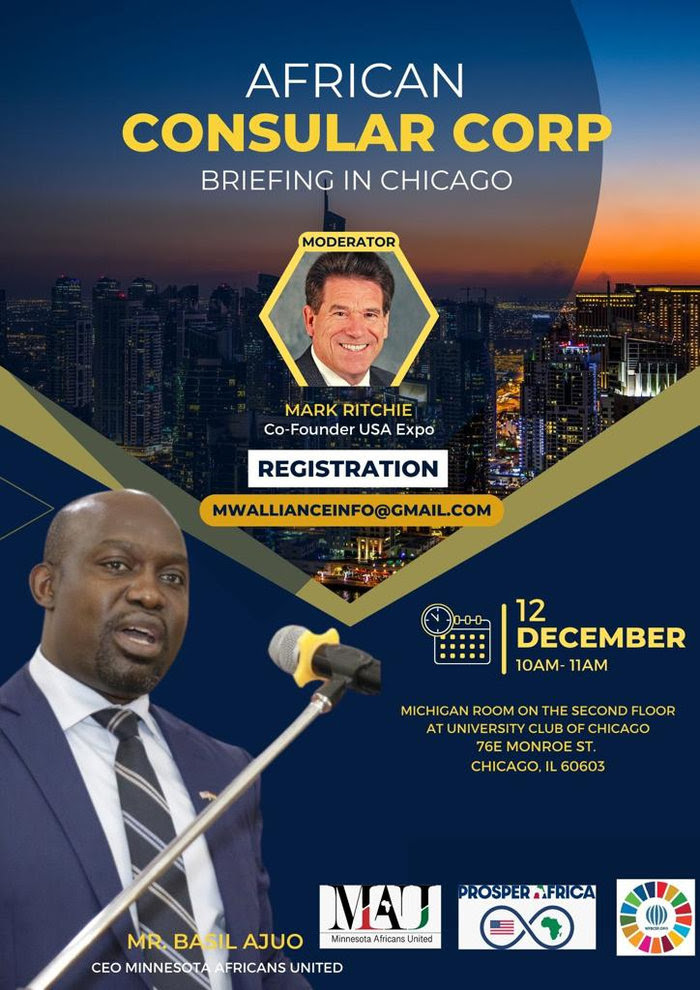
Gearing up for U.S.-Africa Leaders Summit
MAU Leads the charge in getting bid for Minnesota
………As Consular Corp briefing due in Chicago on Monday
By: Mohammed Abu
Minnesota Africans United will host a briefing for Chicago-based Consul Generals and Honorary Consuls on Monday, December 12th at the University Club in Chicago.
This will be an open meeting, with formal invitations to the Consular Corp and to other key leaders, according to an official MAU announcement.
Minnesota Africans United (MAU), the civil society organization representing Diaspora communities from the entire continent, has been crucial to the success of this bid.
MAU has built very good support for Minnesota’s bid by building strong, long-lasting relationships with African leaders through trade missions, webinars, conferences, hosting visiting delegations, and with direct lobbying of Foreign Ministers and Ambassadors, Cabinet Members, and Heads of State.
This briefing will be led by Basil Ajuo, President and CEO of Minnesota Africans United. At this briefing he will report on MAU recent delegations to lobby key decision-makers specifically, and he will discuss how Expo 2027 will benefit the African communities in Chicago.
Joining MAU President Ajuo for this briefing, will be Mark Ritchie, founder Minnesota USA Expo and co-author of the Minnesota’s official bid, entitled “Wellness and Wellbeing for All: Healthy People, Healthy Planet.” He will discuss the important role that Chicago has played over the last decade in this process, and how we can maximize potential benefits for our region.
Minnesota Africans United Minnesota’s bid to host the 2027 World’s Fair is in the final stage, with strong backing from all branches of the Federal Government and from public and private sector leaders throughout the nation.
Chicago has a central role in Expo 2027 – as the host city of nearly all Consulates covering our region, the location of many of our nation’s leading medical and health organizations and corporations, and as a major travel/ tourism hub.
Visitors and participants in Expo 2027 and related activities will travel around the U.S. and across the entire planet – often stopping by Chicago along the way. Heads of State will visit, as will many other key leaders.
The briefing is to provide important background information and an up-to-date assessment of where things stand going into President Biden’s Africa-U.S. Summit.
For more information, please contact Deanna Nord, founder and president of the Chicago-based Midwest Alliance of Health Innovations and Impact.
The Alliance has been one of the key supporters of Minnesota’s Expo bid, working to bring attention to the potential economic benefits for our entire region.
-
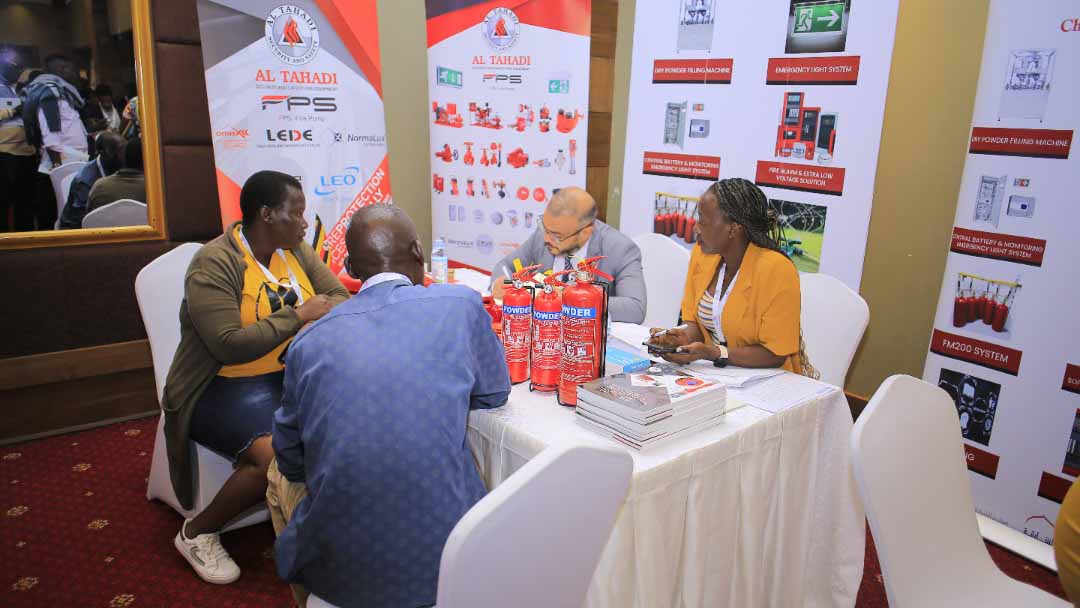
Sharjah Chamber successfully concludes trade trek in Kenya and Uganda
SHARJAH, 20th November, 2022 (WAM) — The Sharjah Chamber of Commerce and Industry (SCCI), represented by the Sharjah Export Development Centre (SEDC), concluded its business mission to Uganda and Kenya, heading a delegation that included private sector representatives and a host of prominent manufacturers in Sharjah and the UAE.
The six-day mission was a hit for the SCCI as it helped explore new areas of commercial and industrial cooperation with Kenya and Uganda in such many vital domains as energy solutions, technology, food security, iron and steel, and agriculture, as well as exploring new opportunities for available investments, in addition to introducing the abundant economic advantages of Sharjah, promoting the facilities granted by the emirate to foreign investors, promoting the ‘Made in UAE’ tag, and providing the SCCI’s associates with the chance to discover new and promising markets, as well as promoting the emirate’s exports.
The first leg of the trade tour, which was in the Kenyan capital, Nairobi, witnessed a Sharjah-Kenya business meeting, during which Abdallah Sultan Al Owais, SCCI Chairman, underlined the fact that the business tour led by the SCCI is in line with the UAE strategy to reach out to more and more international trade partners, and open up more to all friendly countries across the world in order to facilitate the growth of businesses. He pointed out that the Republic of Kenya is the UAE’s sixth trading partner in non-Arab Africa, and that the volume of non-oil trade in 2021 amounted to about US$2.2 billion (AED8.2 billion), which translates into a growth of 20 percent compared to 2020. Al Owais spotlighted the bilateral agreements and the upcoming comprehensive economic partnership agreement, which is the first of its kind between a GCC country and an African nation.
Richard Ngatia, President of Kenya National Chamber of Commerce, and Industry (KNCCI), called on Kenyan businessmen and investors to further ties and build partnerships with the Emirati business community, and benefit from the efforts of the official authorities in Kenya and the UAE to take the bilateral relations to broader horizons.
The trade tour’s second stop was in the Ugandan capital, Kampala, and witnessed a business meeting between Sharjah and Uganda, which highlighted the investment opportunities on both sides, as well as introducing the exceptional advantages that the Emirate of Sharjah possesses, and the emirate’s investment-stimulating legislations and other attractive incentives that contribute to the flow of investments to the region’s markets.
Al Owais pointed out at the meeting that the UAE is a major trading partner for Uganda, serving as a linkage between the African nation and the Middle East and an important hub for Ugandan exports to the Americas, Europe, Asia, China and Japan. He also underscored Uganda’s role as a major gateway for the UAE exports to Africa’s Great Lakes region, nothing that the volume of trade exchange between the two countries increased from US$1.8 billion to US$3.8 billion in 2021.
Jessica Alupo, Ugandan Vice President, said that the mission is a key station for [UAE] businessmen in various economic sectors to learn more about the investment opportunities in Uganda and establish fruitful investment partnerships with their Ugandan counterparts, noting that her government is keen to facilitate investments for the Emirati investors and overcome all the challenges they face.
Amjad Saleh/ Lina Ibrahim
Credit(WAM)